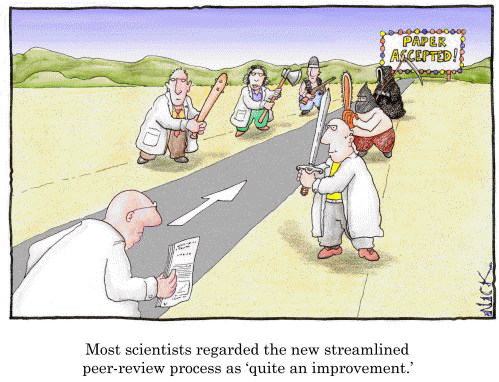|
|
|
|
|
|
|
News & Views item - July 2008 |
![]() Science's Editor in Chief and "Friends" Discuss Peer Review and Journal
Impact. (July 4, 2008)
Science's Editor in Chief and "Friends" Discuss Peer Review and Journal
Impact. (July 4, 2008)
 Bruce
Alberts1, Brooks Hanson2
and Katrina L. Kelner3 collaborated to write this
week's Science editorial on peer review. And if for no other reason
than the weekly has one of the highest impact ratings, when Science
speaks science administrators listen.
Bruce
Alberts1, Brooks Hanson2
and Katrina L. Kelner3 collaborated to write this
week's Science editorial on peer review. And if for no other reason
than the weekly has one of the highest impact ratings, when Science
speaks science administrators listen.
The editorial troika open axiomatically: "Peer review, in which experts in the field scrutinize and critique scientific results prior to publication, is fundamental to scientific progress." However, they follow with an immediate caveat: "Despite its successes, peer review attracts its share of criticism. Reviewers can exhibit bias or only support expected, pedestrian results. They can be overtaxed, uninformed, or ask for unnecessary experiments..."
There follows a discussion of what's needed to improve peer review. We are reminded that these guys know whereof they speak: "At Science, we read thousands of reviews and author responses each year," and they do not consider "the system... to be irretrievably broken; [it] continues to serve science well... [but] papers today are more interdisciplinary, use more techniques, and have more authors [adding to the difficulties of reviewers].
"Finally, and perhaps most important, authors, reviewers, and journal editors should keep in mind the ultimate goal of scholarly scientific publishing to advance our understanding of the natural world. Competition among labs and personal striving for excellence are forces that can be harnessed to accelerate our progress. But in excess these factors can be impediments. The scientific community must collectively ensure that the peer review process continues to serve the loftier goals of our enterprise, which ultimately benefits us all."
The three editors also refer to a letter in this week's journal from Martin Raff, Emeritus Professor in the Department of Biology, University College London.
Professor Raff says: "[T]hese are stressful times for many biomedical scientists, because competition for grant support, jobs, and publishing in the most prestigious journals is accelerating. The stress associated with publishing experimental results [can be] a process that can take as long as obtaining the results in the first place... One problem with the current publication process arises from the overwhelming importance given to papers published in high-impact journals such as Science. Sadly, career advancement can depend more on where you publish than what you publish."
Between Science's editors and Professor Raff they raise issues which ought to be considered by all those who are concerned with foisting an ERA (Excellence in Research for Australia) on the Australian academic community.
While the lag time between concluding research for a publication and its actual publication can be, and often is, lengthy the additional time between publication and secondary consideration by an ERA system can border on the absurd.
In addition the obsession of journal impact is clearly worrisome not only to Professor Raff but to the editors of Science as well.
Senator Carr as Minister for Innovation, Industry, Science and Research could exert a powerful influence for good by fostering improvements in the public research funding bodies' peer review systems, thereby radically improving research funding. But of course in doing so he will be loosening the leash on the research sector.
_____________________________________________________________
1Bruce Alberts is the Editor-in-Chief of Science.
2Brooks Hanson is Deputy Editor for physical sciences at Science.
3Katrina L. Kelner is Deputy Editor for life sciences at Science.